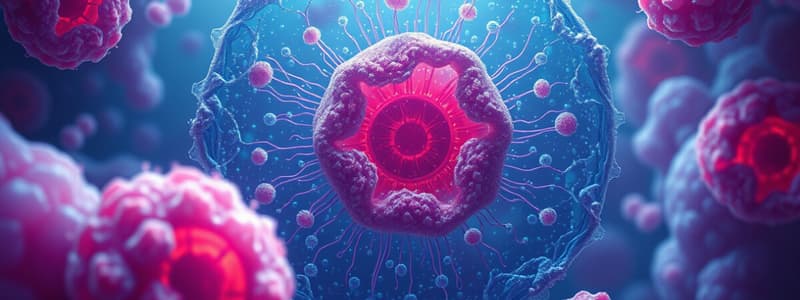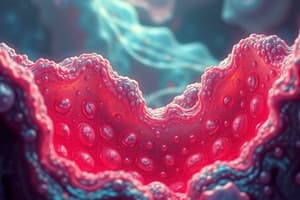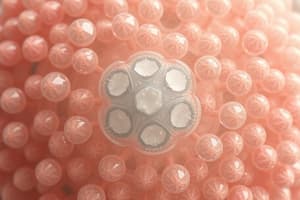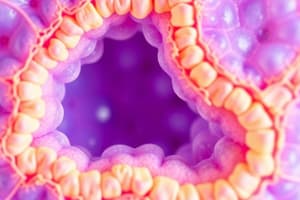Podcast
Questions and Answers
What type of epithelium consists of a single layer of flattened cells?
What type of epithelium consists of a single layer of flattened cells?
- Simple columnar epithelium
- Simple squamous epithelium (correct)
- Stratified squamous epithelium
- Simple cuboidal epithelium
What is the primary function of simple cuboidal epithelium?
What is the primary function of simple cuboidal epithelium?
Secretion and absorption
Where is simple columnar epithelium primarily located?
Where is simple columnar epithelium primarily located?
- Air sacs of lungs
- Upper respiratory tract
- Kidney tubules
- Digestive tract (correct)
Pseudostratified columnar epithelium has a single layer of cells all reaching the free surface.
Pseudostratified columnar epithelium has a single layer of cells all reaching the free surface.
What is the primary function of stratified squamous epithelium?
What is the primary function of stratified squamous epithelium?
What type of tissue allows for stretching in the urinary organs?
What type of tissue allows for stretching in the urinary organs?
Which connective tissue is described as having a gel-like matrix with three fiber types?
Which connective tissue is described as having a gel-like matrix with three fiber types?
What is the primary function of adipose tissue?
What is the primary function of adipose tissue?
The function of cartilage, specifically hyaline, is to support and reinforce, typically found in the locations of the ______.
The function of cartilage, specifically hyaline, is to support and reinforce, typically found in the locations of the ______.
What type of muscle tissue is responsible for voluntary movement?
What type of muscle tissue is responsible for voluntary movement?
What is the primary function of cardiac muscle?
What is the primary function of cardiac muscle?
Flashcards
Simple Squamous Epithelium
Simple Squamous Epithelium
Single layer of flattened cells; functions in diffusion and filtration.
Simple Cuboidal Epithelium
Simple Cuboidal Epithelium
Single layer of cube-shaped cells; functions in secretion and absorption.
Simple Columnar Epithelium
Simple Columnar Epithelium
Single layer of tall cells; functions in absorption and secretion of mucus and enzymes.
Pseudostratified Columnar Epithelium
Pseudostratified Columnar Epithelium
Signup and view all the flashcards
Stratified Squamous Epithelium
Stratified Squamous Epithelium
Signup and view all the flashcards
Transitional Epithelium
Transitional Epithelium
Signup and view all the flashcards
Loose Connective Tissue, Areolar
Loose Connective Tissue, Areolar
Signup and view all the flashcards
Loose Connective Tissue, Adipose
Loose Connective Tissue, Adipose
Signup and view all the flashcards
Reticular Connective Tissue
Reticular Connective Tissue
Signup and view all the flashcards
Dense Regular Connective Tissue
Dense Regular Connective Tissue
Signup and view all the flashcards
Dense Irregular Connective Tissue
Dense Irregular Connective Tissue
Signup and view all the flashcards
Study Notes
Epithelial Tissues
-
Simple squamous epithelium:
- Single layer of flattened cells with disc-shaped nuclei.
- Functions in diffusion and filtration.
- Located in kidneys, air sacs of lungs, and lining of the heart.
-
Simple cuboidal epithelium:
- Composed of a single layer of cube-shaped cells with large central nuclei.
- Functions in secretion and absorption.
- Found in kidney tubules, ducts of glands, and ovaries.
-
Simple columnar epithelium:
- Single layer of tall cells with oval nuclei.
- Functions in absorption and secretion of mucus and enzymes.
- Located in the digestive tract.
-
Pseudostratified columnar epithelium:
- Appears stratified but is a single layer of cells varying in height.
- Functions in secretion, especially mucus.
- Found in the upper respiratory tract and trachea.
-
Stratified squamous epithelium:
- Thick membrane of several cell layers.
- Protects underlying tissues from abrasion.
- Located in the esophagus, mouth, and vagina.
-
Transitional epithelium:
- Composed of basal cuboidal and columnar cells.
- Stretches to accommodate distension in urinary organs.
- Lines ureters, bladder, and part of the urethra.
Connective Tissues
-
Loose connective tissue, areolar:
- Gel-like matrix with all three fiber types and various cells.
- Wraps and cushions organs.
- Located under epithelia throughout the body.
-
Loose connective tissue, adipose:
- Sparse matrix similar to areolar tissue.
- Provides reserve food fuel and insulation.
- Found under the skin, around kidneys, and in the breast.
-
Reticular connective tissue:
- Loose network of reticular fibers in a gelatinous ground substance.
- Supports other cell types including white blood cells.
-
Dense regular connective tissue:
- Contains few elastic fibers.
- Attaches muscles to bones and to other muscles.
- Located in tendons and most ligaments.
-
Dense irregular connective tissue:
- Contains some elastic fibers.
- Withstands tension in multiple directions.
- Found in the dermis of the skin and around organs and joints.
-
Elastic connective tissue:
- Rich in elastic fibers.
- Allows recoil after stretching, maintaining blood flow.
- Located in the walls of large arteries.
Cartilage Types
-
Hyaline cartilage:
- Provides support and reinforcement.
- Found in embryonic skeleton, costal cartilages, trachea, and larynx.
-
Elastic cartilage:
- Maintains shape while allowing flexibility.
- Supports the external ear.
-
Fibrocartilage:
- Provides tensile strength and absorbs compressive shock.
- Located in intervertebral discs and knee joints.
Other Connective Tissues
-
Bone (osseous tissue):
- Supports and protects vital organs.
- Found in various bones of the body.
-
Blood:
- Transports gases, nutrients, and wastes.
- Contained within blood vessels.
Muscle Tissues
-
Skeletal muscle:
- Responsible for voluntary movements.
- Attached to bones or occasionally to skin.
-
Cardiac muscle:
- Contracts to propel blood circulation.
- Located in the walls of the heart.
-
Smooth muscle:
- Propels substances or objects through internal passages (food, urine).
- Found mostly in the walls of hollow organs.
Nervous Tissue
- Nervous tissue:
- Neurons transmit electrical signals.
- Location includes the brain, spinal cord, and nerves.
Studying That Suits You
Use AI to generate personalized quizzes and flashcards to suit your learning preferences.




